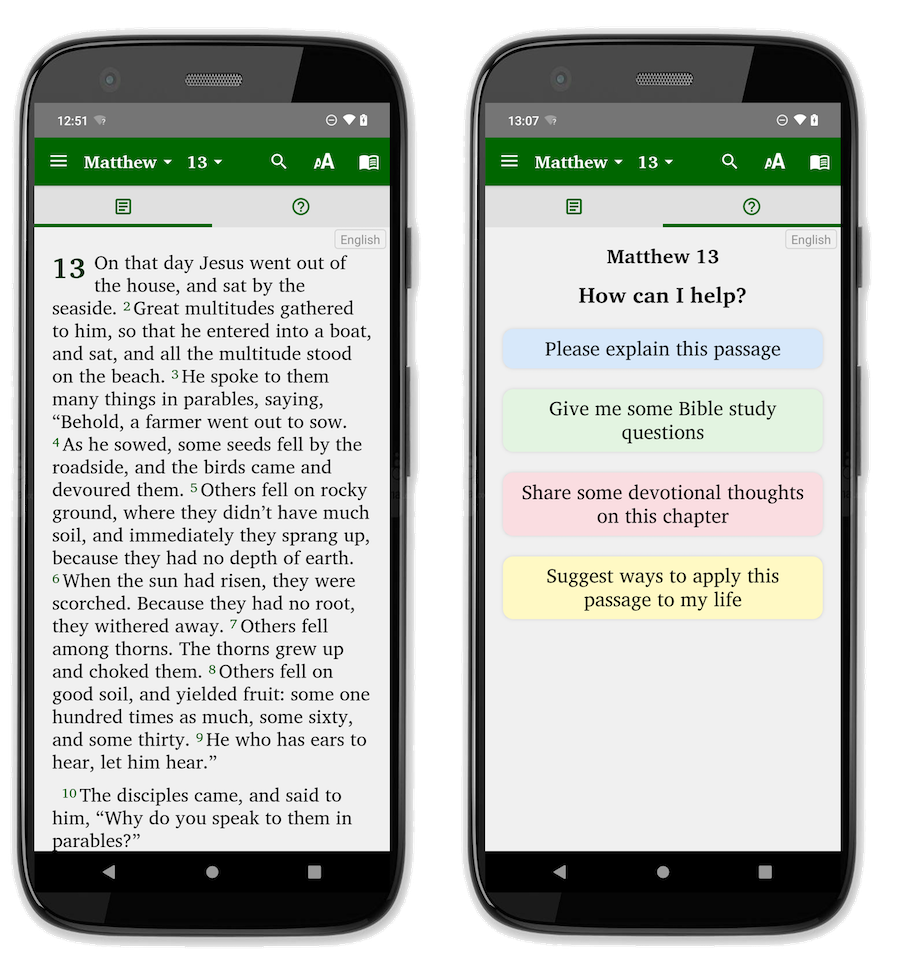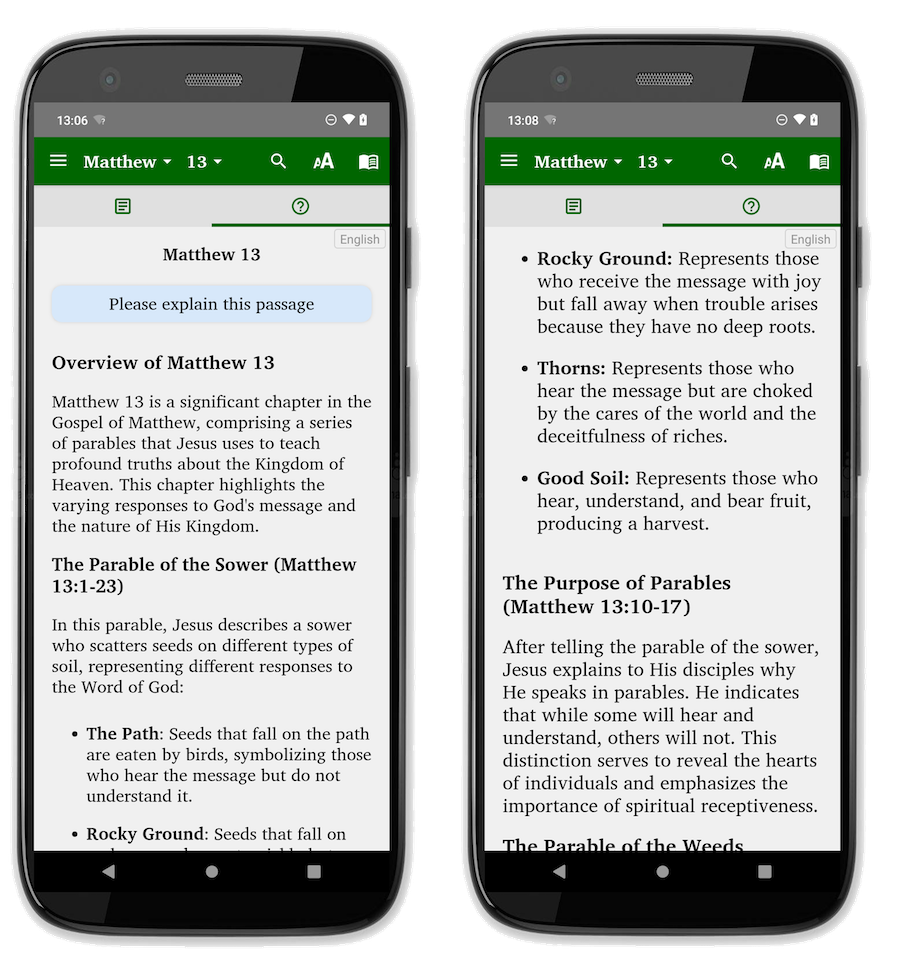
In the world of Bible translation, how do we make newly translated Scriptures available? How do we publish one or more books, a whole New Testament or a complete Bible? In the past the answer was to make printed copies. Today, it is becoming increasingly common to make new Bible translations available in multiple formats: printed books, audio recordings and mobile apps. Among the younger generation especially, there is an expectation that the Scriptures should be available digitally.
This is the vision behind Scripture App Builder, a tool from SIL Global that enables Bible translation teams to make dedicated Bible apps containing the latest books they have translated, without them needing to be programmers.[1] Every element in the app can be contextualized: the icon, the color scheme, the splash screen you see when you launch the app, the fonts, as well as the content—text, audio and video. The text and audio can be synchronized, so that, as the audio plays, the corresponding text is highlighted phrase by phrase. Apps can be published online or shared offline, phone to phone.

It has been so encouraging to see Bible translation organizations and missions around the world using Scripture App Builder to create apps that are just right for the communities they serve. As of today, we know of over 2,500 apps published for 1,960 languages in more than 140 countries, with over 65 million app installs. (See main image at top of article.)
Over the years, we have received a lot of enhancement requests from those building apps, especially regarding how we can encourage app users to more deeply engage with the Bible. This has led to the addition of features such as Bible study questions, quizzes, contents menus, study Bible notes, a verse-on-image editor, Bible reading plans, verse of the day, and various ways of sharing Bible verses with friends on social media.
Adding an AI Assistant to Bible apps
Among the more recent enhancement requests has been the idea of adding an optional AI Assistant in the app. But what would an AI Assistant do?
Our first thought was to add a chat screen in the app where people could ask any question about the Bible and receive a response from an AI chatbot. However, we decided against this approach, because it would involve significant cost to train the system, we couldn’t insure helpful responses, nor avoid user frustration. There are Christian organizations working on improving the ability of chatbots to answer any question about the Bible, so this could certainly be an option in the future.[2]
What we decided to do instead, as an initial experiment, was to provide a guided approach to using AI. Rather than allowing the user to ask anything, we allow the user to select from a predefined list of questions for a specific Bible passage, such as:
● “Please explain this passage”
● “Give me some Bible study questions”
● “Share some devotional thoughts on this passage”
● “Suggest ways to apply this passage to my life”
For example, if the user is reading Matthew 13, they can select the AI Assistant tab, then choose “Please explain this passage”. The app then sends a request to an AI provider service which generates a response to be displayed on the screen.


The secret is in the prompt
Of course, behind the scenes, there is more happening. The AI provider is not only being asked a simple question. The secret in making good use of AI is knowing how to write an effective prompt, i.e. the detailed request that you send to the AI service. The more context and guidance you give the AI as to the kind of response you are looking for, the more likely you are to receive a response that meets your expectations. So, when the user taps on “Suggest ways to apply this passage to my life”, the full request being sent from the app to the AI provider is much more detailed.
A typical prompt could look something like this, beginning with a description of the role you want the assistant to play:
You are a helpful assistant who provides answers in accordance with the Christian faith. This includes belief in the trustworthiness, authority, and relevance of the Bible, the Trinity, the importance of believing in Jesus and following him as Savior and Lord, and of sharing our faith with others. Your answers should reflect the belief that Jesus died on the cross for our sins, rose bodily from the dead, ascended to heaven, and will return one day…
This is to ensure that the AI responds in accordance with your doctrinal basis. Then the app needs to describe the specific task in detail:
Read Matthew chapter 13 and suggest some practical ways of applying this passage in my day-to-day life. Your response should be specific-enough to be helpful, but general enough to apply to anyone, young and old, whatever their situation in life. Be friendly and encouraging.
Scripture App Builder allows the app creator to configure all aspects of these prompts—the list of tasks presented to the user, as well as the detailed role and task information that is sent to the AI service behind the scenes. You can choose from a range of commercially available AI providers and models or connect to your own custom model (which could make use of specific Bible resources).
The advantage of using AI this way is that it guides app users to the kinds of questions that could be useful to ask about a Bible passage, and it asks the AI in such a way that users are more likely to get helpful and biblically-aligned answers. Users do not need to type out long and detailed prompts; the app does this for them behind the scenes.
What we have learned so far
Here are some of the lessons we have learned when experimenting with this feature:
1. AI services are currently better at answering some questions about the Bible than others. They are helpfully insightful when suggesting devotional thoughts and life application but are less useful when asked about other things, such as explaining a passage to children. This highlights the need to do a lot of testing and to restrict the choice of tasks the user can choose from to those that AI appears to be best at answering.
2. The lightest and lower-cost AI models do not provide good enough results. Some models can mix up Bible passages and give misleading or superficial answers. Using more capable models significantly improves the quality of the answers.
3. Language support varies. AI services are best at giving answers in English and other major world languages. Their ability to give helpful answers in other less-resourced languages depends a lot on the AI model. This is an area that will certainly improve in the coming months and years, and organizations such as SIL are actively working on this.[3]
4. AI can still make mistakes. However good the AI responses are in general, there is always the possibility that a less than useful response will slip through. It is therefore important to include a disclaimer in the output, such as:
This answer was generated by an AI assistant which can make mistakes. Please use its responses with discernment, and send us any suggestions for improvement.
For these reasons, it is important to test the system thoroughly and continue to refine the prompts, to ensure that the AI is as helpful and trustworthy as possible.
What people are saying
Initial tests of the AI Assistant feature in apps built with Scripture App Builder have been encouraging. Users have appreciated the AI-generated content as helpful for their spiritual growth, deepening their understanding of the Bible, as well as showing them practical ways to apply the Scriptures in their daily lives. We are keen to go on listening to those who are using the AI Assistant and to respond to requests for improvements.
Two dilemmas Bible app creators are facing
As more organizations experiment with AI in Scripture apps, we are hearing two questions:
1. When creating digital apps with AI generated content, when is the AI reliable enough to give the green light to launch the app? Even with a clear disclaimer, the use of AI is not risk-free, and organizations feel the weight of their spiritual responsibility to “correctly handle the word of truth” (2 Tim 2:15). If an AI-generated response were to mislead, however rarely, it could diminish trust or lead people astray. It is right to proceed with care and discernment.
2. To what extent is it better to package existing tried-and-tested Biblical resources by gifted human theologians, pastors, and teachers in a Bible app, rather than focusing on AI-generated content which will not have been reviewed, and which will clearly not have been produced prayerfully? Scripture App Builder does offer the option of including Study Bible notes in the app to be displayed alongside the text. This will clearly depend on whether such existing materials are available and whether you have permission to use them, which is not always the case.[4]
Looking ahead
The use of AI in Bible apps is still in its early days, presenting both challenges and opportunities. Some people—the early adopters—are already embracing it. Others are experimenting and waiting to see how it develops. What is clear is that the world of Artificial Intelligence is not standing still. As AI models become more powerful, affordable, and able to support a wider range of languages, it is likely that an increasing number of people will be using AI technology to engage with God’s Word, especially if these models are trained to respond in ways that are faithful to Scripture.
And it will be important to move beyond text. The ability for AI tools to understand and generate speech in less-resourced languages could have a transformative impact on Bible engagement around the world. May the Lord give us wisdom to use this technology wisely for his glory.
1 Scripture App Builder software and documentation can be downloaded from software.sil.org/scriptureappbuilder.
2 See for example, Gloo AI (ai.gloo.com) and HelloBible (hellobible.ai).
3 See SIL Global’s AI website for more information: ai.sil.org.
4 The work being done by BiblioNexus to use AI to translate existing Bible study resources into multiple languages is much appreciated. See aquifer.bible.
Author
RICHARD MARGETTS
Richard Margetts and his family are based in West Africa. He serves as a Scripture Engagement and media consultant with SIL Global and is a member of the Scripture App Builder development team.
Subscribe to Mission Frontiers
Please consider supporting Mission Frontiers by donating.
Subscribe to our Digital Newsletter and be notified when each new issue is published!